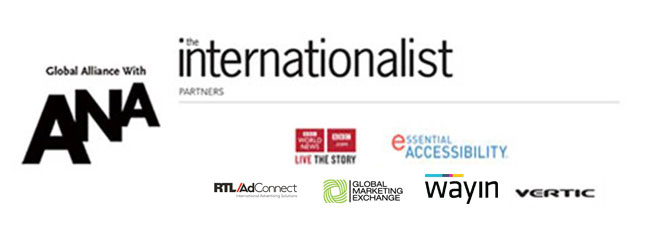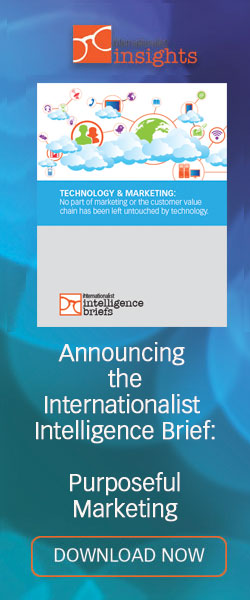

Phil Rowley
See the current issue
of The Internationalist magazine
Find out how to sponsor an issue of Trendsetters
|
|
If you have spotted a trend or given a recent presentation on a global issue, please tell use and don't forget a photo of yourself!

To submit to Trendsetters, contact me at: linkedin.com/in/deborah-malone-ab5897,
The Internationalist group on LinkedIn:
https://www.linkedin.com/groups/2560753/or at Twitter--@DMaloneIntl
Trendsetters: PHD's Phil Rowley says “EDTECH” is the Next Opportunity for Brands
The Internationalist Trendsetters is written by Deborah Malone, founder of The Internationalist.
Phil Rowley helps marketers navigate new technology and prepare their brands for the future. As Group Innovation Director of PHD Global Business, his role is to evangelize about the future, simplify the complex and energize clients. Today, he turns his attention to emergent trend of"life-long learning" and talks about how EdTech, the digital phenomenon borne from yearning for learning, offers new opportunities for brands.
"For the next generation," says Phil Rowley, "life-long learning will be compulsory. The speed of tech acceleration demands employee skillsets must evolve at breakneck pace to keep up with the constant emergence of new disciplines and the demise of old ones. In his book on our age of acceleration, Thank you For Being Late, Thomas Friedman's explains that future citizens cannot afford to rest on their educational laurels: ‘Get up. Open another browser tab. Learn a new skill. Fast!' "
Enter EdTech, which is broadly defined as any digitally-driven, structured learning program, usually backed by an accredited body and with a zero or low-cost entry point. Rowley outlines: "In short, night-school meets podcast, or YouTube meets Open University. Ideal to meet the need for a constantly evolving skillset."
EdTech has been steadily developing over the last few years with global investors piling $8.15 billion into EdTech companies in the first 10 months of 2017. Initially, the big players in the field were Coursera, Udacity, Udemy and The Khan Academy. They beamed lecture content - video, audio, literature - straight into voracious minds via what came to be known as MOOCs, or Massive Open Online Courses.
But now tech giants are moving into this new territory, and whereas the previous focus of EdTech was on lessons for school children and mature learners, there is increasing attention on the world of business: LinkedIn is continually refining its Live Webinars feature; Apple has their iTunes University; and Google now has their Primer app.
Phil Rowley explains how the benefits of EdTech for brands are legion. Here he describes six potential ideas:
- Establish or Reinforce Specialist ExpertiseIf a brand can find a way to shine light on the brilliance of its finest engineers, most dedicated designers, or smartest economists, then it makes a product offering all the more legitimate and compelling. Demonstrating mastery of a field through an academic lens can help make a bold statement about the power of the intellect driving the brand, and use academic legitimacy to establish trust with customers.
Brands can team up with recognized EdTech platforms to emphasize that legitimacy by co-branding ‘academic verticals' relevant to their field. Alternatively, they could look to manufacture their very own learning series or branded courses, deploying their own specialists and experts to front the content. Most important, the output becomes a valuable asset for the brand, amplifying related curricula across paid, owned and earned to target B2B or B2C consumers. Consider the marketing power of H&M sponsoring all fashion or textile qualifications. Or Airbus establishing and advertising an Online Engineering Academy. Or Hewlett Packard creating an accredited Certificate of Cybersecurity.
- Increase Consumer Understanding of a Product Field If a key barrier to the uptake of a product or service is that it is not well understood, then ‘explainer' or ‘Intro 101' content can prove invaluable in helping to remove that barrier. Brands with a complex offering should consider creating educational content, that not only showcases their products, but actively demystifies the way it works or lifts the lid on its internal workings. For instance: a small business owner may be more inclined to switch her operation to a cloud-based supplier if she actively understands what benefits the cloud can bring. Furthermore, a cloud-supplier that delivers that learning, and gets their brand mentally shortlisted as part of that new understanding stands a good chance of winning that new customer when she's ready to commit
- Collect Data On People's Interaction With Your Industry Coursera often divides its course material into categories of difficulty, and similarly other platforms offer pop-quizzes or mini-exams at the end of sessions. The number of people completing modules or online quizzes of a particular difficulty may give valuable insight into the natural ability of the consumer base to understand concepts or technicalities associated with your brand. This could prove useful in learning how to pitch new or additional products or services.
- Upskill Your Staff Similar to the above point, EdTech platforms could also be used for internal training and upskilling of employees. AT&T recently teamed up with Udacity to create nano-degrees for their employees, which they then built in to their employees PDPs.
- Find New Employees and Rising StarsLinked to the previous point, those who seem to motoring through modules and ace-ing assignments may be a future employee for the brand, particularly if they show a deep regard for the brand.
- Help Position or Reaffirm Brand's CSR Responsibilities Though many see education as a right not a privilege, many lack access to that basic right. It may be incumbent on some brands to give something back by offering to fund and assist learning in areas where access to EdTech may not be a given.
According to Phil Rowley, "There will be those who think that brands have no business in education, and of course if a brand's involvement actively corrupts or unduly influences an academic program, this would be totally unacceptable. However, to be frank, it's nothing new for brands to be involved in academia. My school's technology department in Staffordshire, UK still bears the name of its sponsor, local digger company JCB, to this day.
But this time it seems different. First, our hyper-networked world affords brands a solid opportunity to assist learners in their quest to download greater knowledge, it's just now on a global scale. Second, those with a simple Wi-Fi connection and a screen can do all this instantly, with impressively low levels of friction.
So whilst brands can evangelize about their product or service, they can also help consumers improve their prospects in life. In short: brand don't have to be preachers. They can also be teachers.
Phil Rowley was named an Internationalist Agency Innovator this year.

